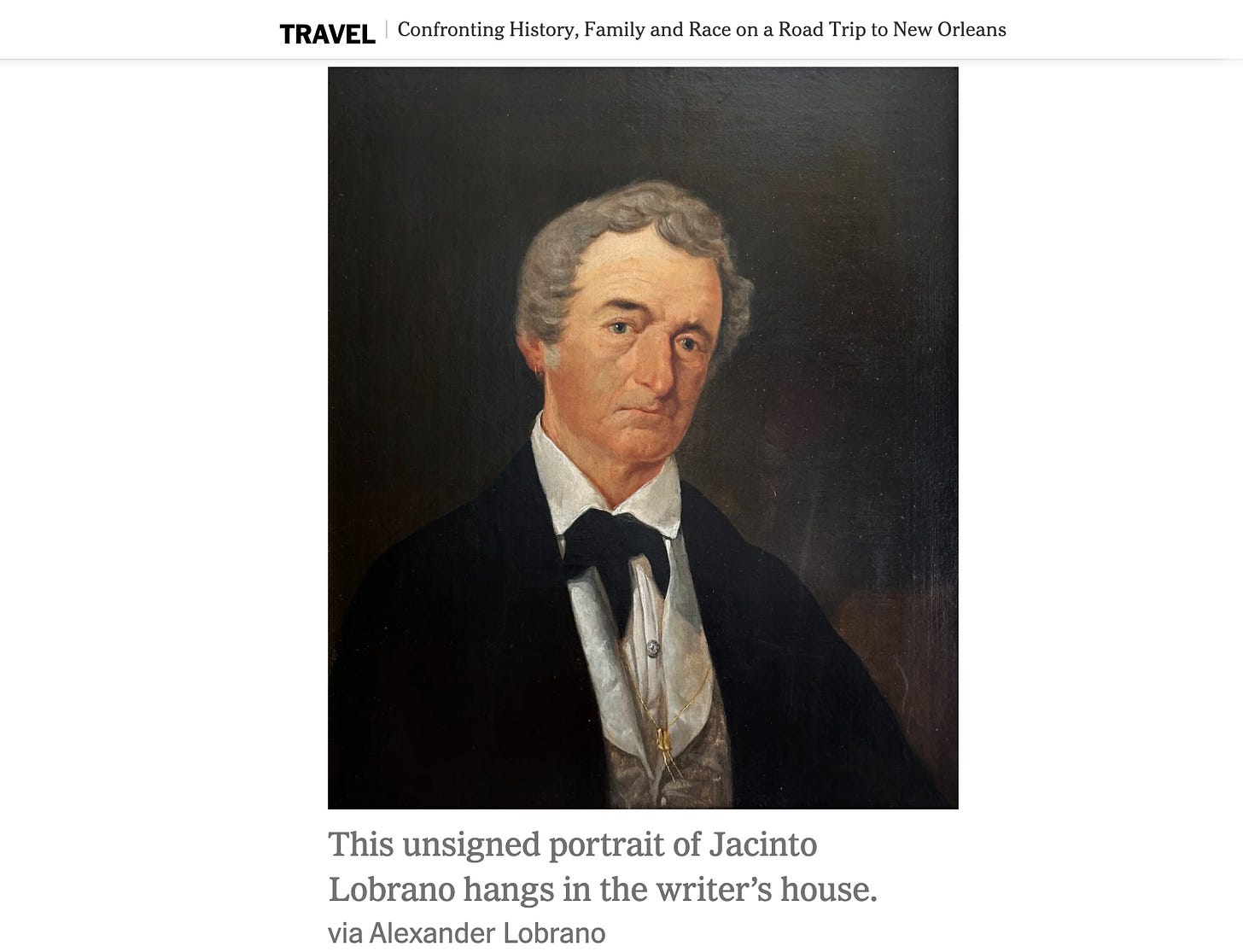The Pirate and the Pope
An American discovers an appalling secret about his beloved pirate ancestor.
From the New York Times’ travel section:
Confronting History, Family and Race on a Road Trip to New Orleans
After a cousin he never knew contacted him, a writer set out on a journey along the Gulf Coast to learn more about her, and himself.
By Alexander Lobrano
May 29, 2025
His hard stare meets me every morning, but now I return his gaze.
The old pirate doesn’t make me flinch anymore, the way he did when I was a boy, because I finally know who he is. I learned this by testing the truth of the family stories that I’d grown up with about Jacinto Lobrano, my great-great-grandfather and the pirate Jean Laffite’s right-hand man, during a six-day trip along the Gulf Coast.
In my father’s family, this unsigned oil painting is passed down to the firstborn son, and now hangs on the wall of my house in a village outside of Uzès in France. Jacinto, who was born on the island of Procida in the Bay of Naples sometime during the 1790s, is depicted as a stern but handsome man in his late 40s, with wavy chestnut hair and a small gold earring in one ear. He presents as a prosperous and possibly respectable family man.
But he was still a pirate, a fact I clung to growing up in a Connecticut suburb that pasteurized difference in defense of propriety. Though my ancestry is 95 percent British Isles, being even a tiny bit descended from a pirate made me different, maybe a little glamorous and potentially wild.
As I learned the first time I read Jacinto’s obituary when I was a freshman in college, he also profited from enslaving people. This shocked me, so I called my grandmother to learn more. She was vague, suggesting he’d just dabbled in the slave trade. Her temporizing didn’t soothe my revulsion, so I did what millions of other white Americans have done when they discovered this evil in their family’s past. I dropped this knowledge like a stone into a well of denial.
I too am shocked, shocked to that find that a sexy, non-conformist Pirate-American could also be an enslaver of black bodies!
Then, eight years ago, I got an Instagram message from a high school student in Mississippi …
It seemed likely that we had ancestors in common, since the pirate had five sons and two daughters, but I didn’t know how. And it didn’t entirely surprise me when I saw Dakota was African American. In New Orleans, where Jacinto Lobrano and his sons had lived, sexual relations between the races were common, often initiated by white men who forced themselves on enslaved women. …
After all …
Paywall here.
what woman has ever been attracted to a pirate?
… Unexpectedly, I welled up while unwrapping a turkey sandwich. My sudden gushing was fed by exhaustion, happiness, relief and shame, a very deep shame. I’d finally realized that the real reason for my trip was that I was seeking atonement. I’d failed, too, because there could be no atonement.
The author isn’t despairing that there can be no atonement for his ancestry’s pirate part — being a pirate is cool! — but for the slave-owning part.
By the way, Harvard geneticist David Reich led an analysis of the 23andMe database in 2014. It turned out that customers who self-identified as black before getting their results back averaged 73.2% black, while customers who initially self-identified as white averaged 0.19% black. So Americans who think of themselves as black are about 385 times more sub-Saharan by genetic ancestry than Americans who think of themselves as white.
Louisiana is the main place where this genetic racial divide is less stark due to its Latin cultural roots, which rejected the Anglo-Saxon One Drop Rule for determining racial identity.
Hence, the Pope being a self-identified white man who is a little bit black from his roots in New Orleans.




Atonement? What a weenie.
Billions of people living in abject poverty and/or are being politically persecuted in 2025, but this guy is inconsolable because his pirate ancestor (whose DNA he shares is about 1/32). Give me a break. Here is an interesting poll question. Ask the average white person if he/she would prefer that their great great great grand daddy owned the plantation or was a poor white subsistence farmer living in a shack. Now ask the average black person if he/she would prefer that they were a descendent of the queen/king of a prominent Africa tribe or a poor villager living in the middle of the jungle? Trick question of course.
I‘d go with the middle ground. I’d like my great great great grand daddy to be the bastard son of the chambermaid. I get the benefits without the moral shame.